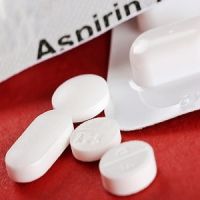Aspirin (acetylsalicylic acid) has the unique ability to to irreversibly acetylate serine in the active site of cyclo-oxygenase (COX), permanently blocking its action in prostaglandin synthesis. This results in analgesic, antipyretic, and anti-inflammatory effects. In the platelet, it has a more durable and sustained effect. However, while aspirin can reduce platelet activity and result in the primary reversal of thrombus formation, there is also a risk of bleeding associated with its use.
The efficacy of aspirin for the prevention of acute cardiovascular events and after vascular procedures has been tested in multiple trials. In the ISIS-2 (International Study of Infarct Survival-2) trial, the use of aspirin significantly reduced the risk of serious vascular events, including death. The benefits were observed within a few days, and the risk of bleeding was low. In other trials following a vascular procedure such as stenting, aspirin was again found to reduce the risk of events over and above any of its bleeding downsides, in the short term. Based on these results, most clinical guidelines for acute vascular events and certain vascular procedures recommend aspirin for secondary prevention of cardiovascular events.
However, the question is whether aspirin could be effective in preventing a first vascular event. There are very few trials in primary prevention, and the ones that were conducted had varied results.The Physicians' Health Study.4 Meta-analysis was the first trial to show that aspirin could prevent a primary cardiovascular event by about 12%. This was not as dramatic as the 22% reduction that was observed in secondary prevention. The reduction increased to 18% when only the first 3 years of trial were included. The hypothesis is that participants did not continue to take aspirin in the later years, which could lead to the lower protective benefit.
One of the reasons for decreased use of aspirin over time could be the increased risk of bleeding, which is higher in patients without a prior cardiovascular event. Not all bleeding events are severe, but even bruising and minor bleeding can be irritating for the patient and can lead to discontinuation of the treatment. Also, for some patients, the risk of bleeding can outweigh the benefit of the drug. Therefore, clinical guidelines with respect to the use of aspirin in primary prevention tend to differ. The US Preventive Services Task Force recommends starting aspirin after weighing the impact of aspirin on primary vascular events and bleeding, and the longer-term effects in reduction of risk of colorectal cancer. The use of aspirin should be based on the patient's risk of future vascular disease versus bleeding events.Factors such as age, life expectancy and personal preferences should also be considered.
Three recently published trials also address the limitations of existing data for primary prevention. The ARRIVE (Aspirin to Reduce Risks of Initial Vascular Events) trial with 12,456 participants at moderate risk of CV disease showed no significant difference in the main outcome (composite of CV death, MI, unstable angina, stroke, or transient ischaemic attack) in the aspirin arm versus the placebo group. Rates of serious adverse events were similar in both groups; however, the incidence of gastrointestinal bleeding was higher in the aspirin group compared with placebo, even though these events were predominantly mild.
The ASCEND (A Study of Cardiovascular Events in Diabetes) trial was undertaken to specifically examine the role of aspirin for primary prevention in those with diabetes. In total, 15,480 individuals were randomised to 100 mg of aspirin daily versus placebo. Over a mean follow-up of 7 years, those randomised to aspirin had a significant reduction in primary CV events (MI, stroke or transient ischemic attack, or all-cause mortality. However, major bleeding events were more common in the aspirin arm.
The ASPREE (Aspirin in Reducing Events in the Elderly) trial was designed to specifically address the role of aspirin for primary prevention in older adults.19,114 healthy older adults were randomised to 100 mg aspirin daily versus placebo. The study was stopped early and there was no significant difference in the primary composite outcome of death, dementia, or persistent physical disability. Rates of bleeding were higher in the aspirin group, with the majority being gastrointestinal bleeds. There was an increased rate of all-cause mortality in the aspirin group that was attributed to the increased risk of cancer seen in those assigned to aspirin.
A recently published meta-analysis that combines these new trials with 10 previous primary prevention trials includes data from a total of 164,225 participants. Findings demonstrate that the estimated risk and benefits of aspirin for primary prevention are not materially altered. The risk of CV disease was lowered by 11%, Bleeding risk was increased 43%. There was no overall effect on total cancer during the trials. There was a nonsignificant 6% reduction in total mortality,
All this data taken together demonstrates that the impact of aspirin on primary prevention and the risk of bleeding has not changed much. Findings suggest and support the individualised approach to aspirin treatment, which in turn, is dependent on accurate estimation of the risk of future events. Decades of trial experience shows that aspirin is an important medication in the acute treatment of vascular events, after certain procedures, in secondary prevention, and in primary prevention, if it is used in the right patients.
Source: American College of Cardiology
Image Credit: iStock
Latest Articles
cardiovascular disease, aspirin, primary prevention, secondary prevention, vascular events
Decades of trial experience shows that aspirin is an important medication in the acute treatment of vascular events, after certain procedures, in secondary prevention, and in primary prevention in the right patients.



























